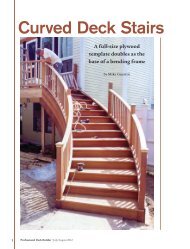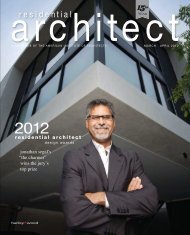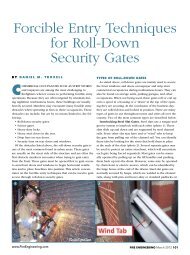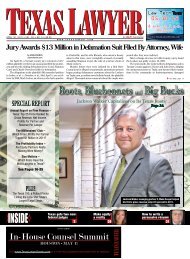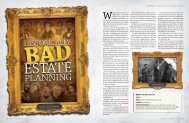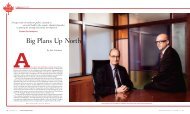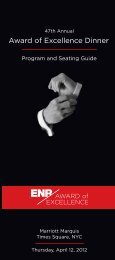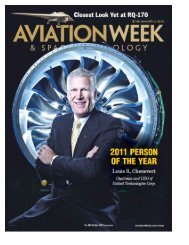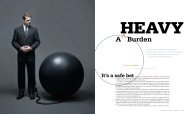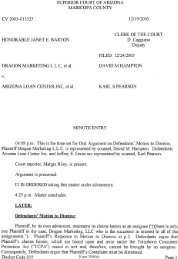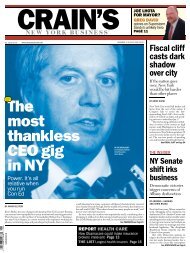ISN'T IT RICH? - American Business Media
ISN'T IT RICH? - American Business Media
ISN'T IT RICH? - American Business Media
You also want an ePaper? Increase the reach of your titles
YUMPU automatically turns print PDFs into web optimized ePapers that Google loves.
who is fiercely protective of the money-minting franchise that is Delawarecorporate law, which is known for a predictable, conservativebrand of jurisprudence that corporate America likes.Throughout his career the strong-willed Strine has been driven tomake a difference. If he wanted to make a statement in Southern Peru—which was his first major ruling since becoming chancellor—he certainlydid. “He’s always been a bold thinker,” says William Lafferty ofWilmington’s Morris, Nichols, Arsht & Tunnel, who’s known StrineThe chancellor steadfastly defends his court.“We are the Bergdorf Goodman, not the Dollar Store,of corporate law,” says Strine.since they were undergraduates and soccer teammates at the Universityof Delaware. “He’s not afraid to shake things up.” But corporate Americadoesn’t want to feel too much shaking in Delaware. How will Strinebalance corporate America’s desire for comfort with his own penchantfor boldness? If the Southern Peru case is any indication, it will be afascinating story to watch.The museum of the Delaware Historical Society inWilmington is small and modest, befitting the union’s second-tinieststate. One exhibit commemorates the world’s largest frying pan, createdin 1950 for the Delmarva Chicken Festival.In a nearby corner is a small exhibit dedicated to Delaware’s courts.There’s not much to see. Visitors can play an interactive game called“You Decide,” in which they’re given the facts of famous corporatecases and invited to rule. The judicial robe of Chancellor William Marvel,who served on the court for more than two decades, until 1976,qualifies as the most eye-catching part of the exhibit.An old black robe may not offer the sensationalism of the world’slargest frying pan, but the Chancery Court is more important to thestate than its large poultry industry, or any other business. Roughly onequarterof Delaware’s budget comes from franchise taxes paid by themore than 850,000 businesses that choose to incorporate here. Theyselect Delaware because they like the state’s courts, which traditionallyhave given officers and directors a lot of leeway to run companies asthey see fit. (And allow them to avoid pesky juries.)Around the corner from the museum rises the modern county courtbuilding, with its blue-tinted glass facade, which houses the ChanceryCourt. On the eleventh floor, Strine is spending most of this week inJanuary reading and writing in his chambers. Early in an interviewStrine displays his famed cutting wit by taking a jab at the “soulless”design of the courthouse. “It looks like something created by a prisonarchitect and an airport architect who got drunk together,” he says.Strine is wearing suspenders decorated with chickens—a gift fromhis former boss, the ex-governor and current Democratic U.S. senatorTom Carper—and a tie adorned with small U.S. flags. “This is my nation-and-stateoutfit,” he explains with a smile. His chambers resemblethe typical office of a busy lawyer who is slightly messy, assuming thatthat lawyer has a man crush on James Taylor. Two large framed postersof the singer hang behind Strine’s desk, near a pile of music CDs.The judge notes that he uses music to assuage his fear of writing. “I’venever gotten over the anxiety I have about writing,” he says. “There’sthat line between me and the public revelation of my stupidity that Iworry about crossing.”If Strine suffers from writing anxiety, he’s managed it well. Since hewent on the bench in 1998, he’s published 28 articles, ranging from anacademic discussion of corporate governance for the Harvard Law Reviewto an article analyzing excessive corporate risk-taking for The New YorkTimes’s Dealbook column. The more than 100 published decisions that he’spenned are typically long and crafted with an eye to engage and provoke.Strine has developed a cultlike following amongthe ranks of America’s top corporate lawyers. Thosewho are willing to talk on the record, not surprisingly,shower him with praise. “I think the worldof him,” says Robert Spatt of Simpson Thacher &Bartlett. “He has a fabulous mind, a great wit, andan almost unlimited capacity for intellectual curiosity.”Says plaintiffs lawyer Stuart Grant of Grant &Eisenhofer: “I think Leo Strine will go down in thehistory of Delaware as one of the finest jurists we’veever had, and maybe beyond Delaware.” TheodoreMirvis tops Grant and takes the praise to anotherlevel. “He’s the greatest man who ever lived!” exclaims the Wachtell, Lipton,Rosen & Katz partner, possibly indulging in a bit of hyperbole.Allowed to speak without attribution, one lawyer mentions anotherquality echoed by others. “He’s an incredibly impressive jurist, but thefirst word I think of with him is ‘scary,’ ” he says, alluding to Strine’s occasionalbursts of temper and penchant for cutting down lawyers whodisplease him.Delaware’s Chancery Court dates back to 1792 and operated with justone judge until 1939. It’s still a relatively modest operation, consistingof Strine, four vice-chancellors, and their staff. According to the court’smost recent annual report, 4,184 cases were filed with the court in 2010,and less than a quarter were corporate disputes. As a court of equity, thecourt’s jurisdiction covers all sorts of matters in which parties are seekingsomething other than money damages, including trusts and estates cases(which make up more than half of the court’s caseload) and guardianshipfilings. Strine earns a little more than a federal court of appeals judge:$185,750. (His wife is a physical therapist at a children’s hospital, andthey have two teenage boys.)Strine is driven by a work ethic that’s remarkable even by the standardsof a type-A profession. As if he’s not busy enough presiding overhis court docket, he teaches at no fewer than four law schools (TheUniversity of Pennsylvania, Harvard, Vanderbilt, and the Universityof Southern California), flies around the country to appear at numerouscorporate law panels, was chosen as a fellow for a program run byThe Aspen Institute for “accomplished entrepreneurial leaders,” andcoached his sons’ soccer teams until the end of 2010. And in a display ofdetermination that might be characterized as either admirable or crazy,he ran every single day for 12 years straight—through snow drifts, drivingrain, and dark city streets at 4 a.m.—until his body broke down. “Atthe end when I was running,” he admits, “I looked like somebody whoneeded an ambulance or was drunk.”As chancellor, Strine gets to choose his cases. At press time his docketincluded litigation over Martin Marietta Materials Inc.’s hostile bid forVulcan Materials Co., and derivative suits brought by shareholders ofBarnes & Noble, Inc., and Bank of America Corporation. It also includesa case in which shareholders of El Paso Corporation have challenged asale of assets to Kinder Morgan Inc. on the grounds that one of El Paso’sadvisers, Goldman Sachs Group, Inc., has a conflict because it owns 19percent of Kinder Morgan.The hallmark features of a Strine opinion are a searching inquiry intothe facts, and a long string of footnotes bursting with his stream of consciousnessobservations about all matters of corporate law, popular culture,and beyond. Strine’s ruling on the merits of the Southern Peru case, forexample, runs 106 pages and contains 206 footnotes, and probes with rigorand tenacity as it deconstructs exactly how that deal was put together.The shareholders of Southern Peru claimed that the company, whichis listed on the New York Stock Exchange, paid too much for a Mexicanmining company that it bought from its controlling shareholder, GrupoMéxico, S.A.B. de C.V. At the start of the trial, Strine expressed skepticismabout the plaintiffs’ claims against defendant Grupo México, butafter hearing the evidence, he changed his mind. In his October ruling,he systematically poked holes in the complex formulas that the partiesused to evaluate the mining company’s value.He concluded that Southern Peru’s special committee of independentdirectors—who were advised by the prestigious combo of GoldmanSachs and Latham & Watkins—relied on a flawed and strainedjustification to pay the $3.1 billion price demanded by Grupo México,despite strong evidence that the price was inflated. Notably, the judgewasn’t impressed by the fact that Goldman Sachs had given a fairnessopinion to support the deal, or that former Wachtell, Lipton partnerHarold Handelsman played a lead role on the specialcommittee. Grupo México, as a controlling shareholderof Southern Peru, breached its duty of loyaltyto act in the best interests of the company and itsstockholders, Strine ruled. He ordered Grupo Méxicoto return $1.347 billion of Southern Peru stockit received in the deal, and tacked on $685 million ofinterest. Grupo México is appealing.Despite his thorough trashing of this transaction,Strine didn’t hold the special committee accountable.In 2010 he dismissed claims against Handelsman andthe others in a ruling from the bench. His hands werepartly tied: As Delaware law allows, Southern Peru’scharter insulates directors from liability for a breachof fiduciary duty, with certain exceptions for intentionalmisconduct.Steven Davidoff, associate professor at The OhioState University Moritz College of Law, praises Strineas a “clear thinker,” but takes issue with Delawarecourts’ tendency to absolve officers and directors ofwrongdoing. “I don’t agree with some of the Delawaredecisions,” he says, although he declined to name anycases in particular. “I think Delaware should be lessprotective of directors and officers and needs to holdthem responsible when they make really bad decisions.But that is a difficult line for the court to walk. Theyhave a very important franchise to protect.”In November, Columbia Law School held aconference on the Delaware Chancery Court. Duringa morning panel discussion, professor BernardBlack of Northwestern University School of Law arguedthat Delaware’s market share of corporate governancelitigation was shrinking. From 1995 to 2009Delaware’s share of cases where directors were suedfell from more than 80 percent to less than 40 percent,according to his data. (Professor Davidoff hasalso looked at this topic, and found that while Delaware’smarket share might be slipping, it’s holding onto most of the strongest cases.)In his working paper on the subject, Black suggestsseveral possible reasons for the change, including thesurge in federal securities litigation, and the fact thatmany stock option backdating cases were filed outside Delaware. Blackalso suggested that plaintiffs were filing cases outside Delaware in partbecause Strine and vice-chancellor J. Travis Laster—who were both sittingin the Columbia audience—had too often said nasty things aboutplaintiffs lawyers, and had too often been stingy with fee awards.In particular, Black pointed to Strine’s 2005 ruling in a shareholderchallenge to a Cox Communications Inc. leveraged buyout where thesettlement led to very minor alterations in the deal. Strine refused to approvea $4.95 million attorneys’ fee that both sides had agreed on, andslashed it to $1.3 million. The judge explained that he wouldn’t award apremium where the plaintiffs lawyers had taken no appreciable risk, andwhere the litigation didn’t have a significant impact on the deal price.(The following year, in a case involving Hollinger International Inc.’souster of former chairman Conrad Black, Strine gave a less than glowingassessment of the fee award process in this statement from the bench: “Ifeel queasy a lot of the times when I examine applications for attorneys’fees. But I have to get right in there, take my Maalox, ignore the vilesmell, and see whether a fee should be awarded.” continued on page 89In His Own WordsOver the years Chancellor Leo Strine, Jr., has thought long and hard about the properfunctioning of the business world. In his writings off the bench in particular, he’s madeit clear that he supports stronger government regulation. These excerpts show Strine’sthinking on the most recent financial crisis and the Enron scandal.“Distilled down, what is most critical is that robust prudential regulation protectingsociety from risky corporate activity abated, precisely when corporations facedincreasingly strong pressures to engage in much riskier endeavors in order to generateshort-term results. In the financial sector, this potent cocktail was chased by severalgovernmental interventions to rescue the industry when its ‘innovative’ activitiesthreatened its health, a course of conduct that suggested that the financial industry couldtake risks other industries could not, because it had a de facto form of federal insurance.”—“Why Excessive Risk-Taking Is Not Unexpected,”The New York Times Dealbook, October 2009.“Rawest of all [in the aftermath of the financial crisis], though, was the dealfor millions of hardworking people who were paying their bills until the calamitydestroyed economic growth and resulted in double-digit, persistent unemployment.They continue to suffer as do many others who have retained their jobs but enduredfurloughs, benefit cuts, and pay freezes, and seen their local taxes increase as servicesby budget-crunched governments diminish.”—From a March 2011 speech at The University of Western Ontario.“For a variety of reasons . . . institutional investors often have a myopic concernfor short-term performance. . . . What is even more disturbing than hedge fundturnover is the gerbil-like trading activity of the mutual fund industry which is theprimary investor of <strong>American</strong>s’ 401(k) contributions.”—“One Fundamental Corporate Governance Question We Face:Can Corporations Be Managed for the Long Term Unless TheirPowerful Electorates Also Act and Think Long Term?,”The <strong>Business</strong> Lawyer, November 2010.I confess that part of me sees the Enron situation as a healthy, if very painful, lessonabout the need for investors and other market players to be attentive to their ownself-interest. Caveat emptor! Caveat emptor! Caveat emptor! The after-the-fact threatof federal and state law liability can never be an efficient or adequate method by whichto ensure corporate integrity. And quite bluntly, it is questionable whether costlygovernment policies ought be directed at placing crutches under well-heeled investorswho can walk for themselves.—“Derivative Impact? Some Early Reflections on theCorporation Law Implications of the Enron Debacle,”The <strong>Business</strong> Lawyer, August 2002.80 March 2012 | americanlawyer.comThe <strong>American</strong> Lawyer | March 2012 81



